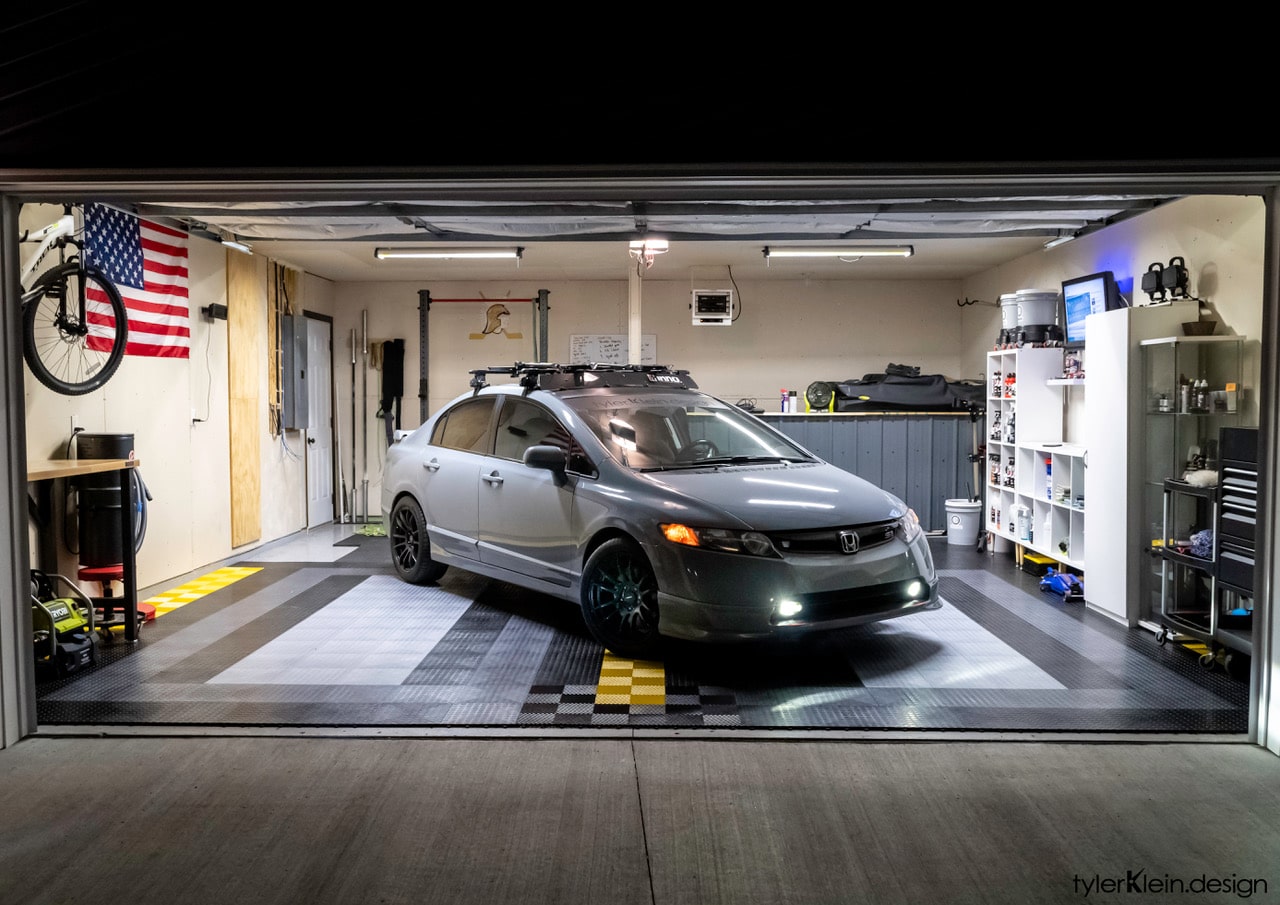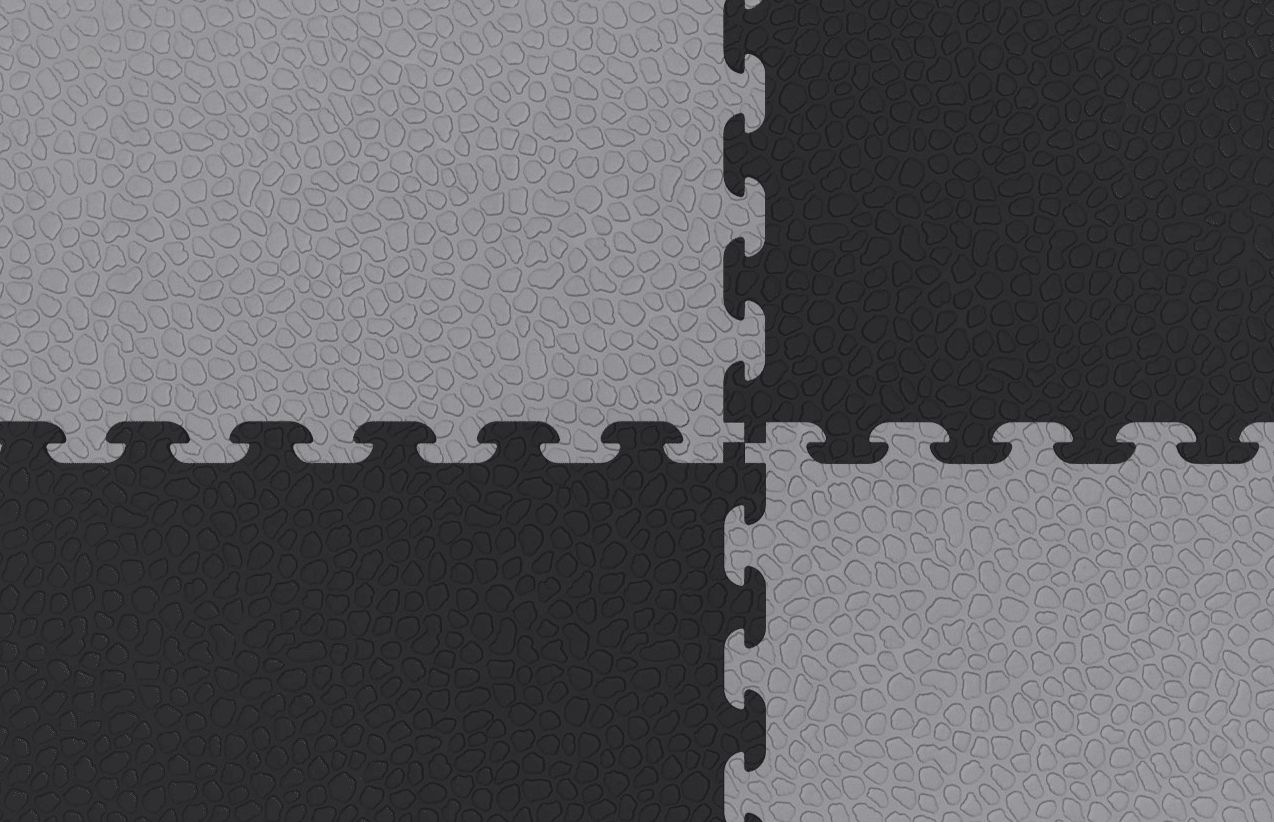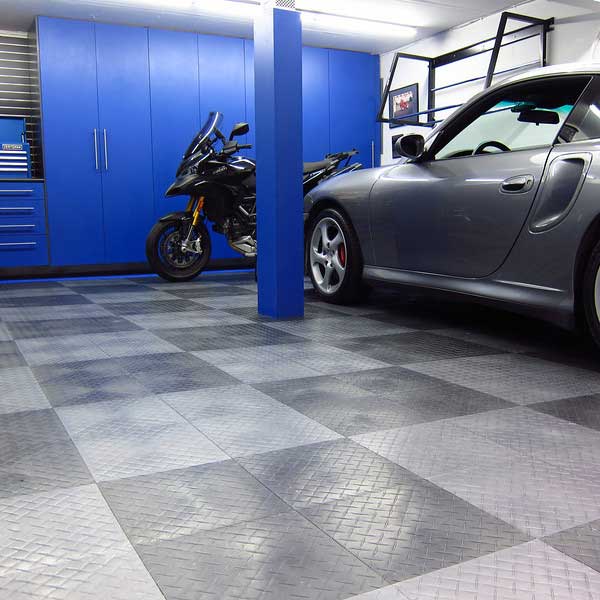The Ultimate Guide to Garage Flooring: Everything You Need to Know
If your garage floor has seen better days—or worse, you’re still parking on dusty, cracked concrete—you’re in the right place. This isn’t just any guide. It’s your full-throttle roadmap to turning that grimy slab into a clean, functional, and even stylish space. Whether you’re a seasoned DIYer, a first-time homeowner, or just tired of oil stains haunting your concrete, we’ve got your back.
Why Garage Flooring Matters
Garage floors take a beating: hot tires, freezing temps, dropped tools, chemical spills—you name it. While bare concrete technically “works,” it’s not ideal. Upgrading your garage flooring isn’t just about aesthetics—it’s about safety, protecting your investment, and creating a usable space that’s easier to clean and enjoy.
What We’ll Cover in This Guide
- All your garage flooring options—tiles, coatings, mats, and more
- Honest product comparisons with pros, cons, and use cases
Table of Contents
- Garage Floor Tiles
- Roll-Out Garage Flooring
- Containment Mats for Winter
- Epoxy Garage Floor Coatings
- Metallic Epoxy Finishes
- Polyurea Garage Floor Coatings
- Garage Floor Paint (Don’t Do It)
- Garage Flooring Comparison Chart
- Garage Flooring FAQs
- Final Thoughts
Garage Floor Tiles: The Best DIY Garage Flooring Option
Let’s kick this off with the most popular and flexible garage flooring option: interlocking garage floor tiles. If you’re a DIYer looking for a no-mess, no-fumes, no-drying-time solution that can handle serious abuse—this is where you want to start.
Why Garage Floor Tiles Work So Well
Garage tiles, especially rigid polypropylene tiles, check every box for homeowners who want fast results without compromising on strength or style. They’re designed to snap together like big adult LEGO pieces—no glue, no tools (except maybe a rubber mallet), and you can install a whole garage in an afternoon.
Rigid Polypropylene Garage Tiles (Recommended)
These are the most popular style for good reason. Rigid tiles are made from impact-resistant polypropylene, which is ideal for supporting vehicles, car lifts, rolling toolboxes, and everything else you keep in your garage.
- Strength: Supports 40,000+ lbs. per square foot
- Resistance: Immune to oils, chemicals, and salt
- Ventilation: Open-profile options let moisture escape, preventing mildew
- Style: Choose from diamond plate, coin top, or ribbed finishes
PVC Garage Tiles (Alternative Option)
If you want something a little quieter underfoot with a touch more flexibility, PVC garage tiles are another option. They’re especially useful in garages that double as gyms or workshop spaces. However, for standard automotive use and long-term durability, rigid tiles are the better call.
- Softer feel underfoot
- Better sound dampening
- Still resistant to water and chemicals
Design & Customization
One of the coolest things about garage tiles? You can go wild with design. Create a two-tone checkerboard. Outline a parking area. Add branding or color accents. And if you mess up—or get bored—you can swap them around any time.
- Modular: Replace single tiles without redoing the whole floor
- Mix & Match: Custom color patterns and layout styles
- Edging: Finish off the entrance with beveled ramps
Installation Tips
- Sweep and clean your floor thoroughly before laying tiles
- Leave a small expansion gap around the perimeter
- Use a rubber mallet for a snug, satisfying click-together finish
Who Garage Tiles Are Best For
- DIYers who want an easy install
- Car enthusiasts who want a clean, stylish garage
- Anyone tired of staring at stained, cracked concrete
If you want instant transformation with zero curing time, tiles are the king of garage flooring. They’re beautiful, functional, and built to last—even if your parking skills aren’t.
Roll-Out Garage Flooring: Instant Upgrade, Zero Tools
Need something fast, simple, and reliable? Roll-out garage flooring mats are the MVP of quick fixes. These mats are made from flexible, heavy-duty PVC and come in pre-cut sizes or bulk rolls that you can trim to fit your space perfectly.
Why Roll-Out Mats Work So Well
- No installation tools required: Unroll and you’re done
- Protects concrete: Guards against oil, salt, snow, and tire marks
- Portable: Take it with you if you move
Unlike tiles or coatings, there’s no commitment—if you change your mind later or want to upgrade, simply roll it up and store it or reuse it somewhere else.
Great For:
- Rental homes and temporary garage upgrades
- Budget-conscious DIYers
- Quick weekend projects that don’t require drying or curing
Mat Features
- Textured surface for traction
- Easy to clean with broom, mop, or hose
- Available in patterns like ribbed, coin, and diamond plate
These mats don’t just hide ugly concrete—they protect it. If you’re dealing with pitting, spalling, or salt damage, roll-out garage mats act like a shield.
Containment Mats: Protect Your Garage from Winter Slop
If you live in an area where winter means snow, slush, and salt—and you actually use your garage to park your car—then you need a containment mat. These simple, smart products are designed to trap melted snow, road grime, and all the mess that drips off your car every day during winter.
What Are Containment Mats?
Containment mats are heavy-duty garage floor mats with raised edges (sometimes called berms) that hold water and debris in place. Instead of letting dirty snowmelt pool on your concrete or seep into your tile seams, containment mats create a waterproof barrier.
Why You Need One
- Stops puddles: Raised edges trap gallons of water, snow, and slush
- Protects floors: Saves your coatings, tiles, and bare concrete from salt and freeze damage
- Reduces cleanup: Keeps the mess in one place so you’re not tracking grime into the house
When to Use Containment Mats
- During the winter season (October–March depending on your climate)
- If you’re parking snow-covered vehicles in your garage
- In climates where de-icing salt and sand are a concern
Features That Matter
- Thick, flexible material: Designed to hold up to tire friction and freezing temps
- Built-in or replaceable berms: Choose depending on whether you want easy draining or full containment
- Easy to clean: Just drag it outside and spray it off in spring
Containment mats are one of the most underrated tools in your garage protection kit. Think of them as an insurance policy for everything else you’ve done to upgrade your garage floor.
Epoxy Garage Floor Coatings: Durable and Sleek—When Done Right
Epoxy garage floor coatings are one of the most popular choices for homeowners looking for a smooth, cleanable, and chemical-resistant finish. But before you grab a roller, it’s important to understand what makes epoxy great—and where it can fall short.
What Is Epoxy?
Epoxy is a 2-part chemical coating that combines a resin with a hardener to create a tough, plastic-like film on your garage floor. Once cured, epoxy is resistant to most household and automotive chemicals, and can last for years with proper prep and application.
Benefits of Epoxy Flooring
- Glossy, professional-looking finish
- Easy to sweep and mop
- Customizable with flake systems and colors
- Protects concrete from staining and wear
The Catch: Prep Work Is Everything
Most epoxy failures happen because the concrete wasn’t properly prepared. That means cleaning, degreasing, etching (or grinding), and testing for moisture. Skimp on prep, and you’re likely to see peeling or delamination.
When Epoxy Is a Good Choice
- Low to moderate traffic garages
- Homes with clean, dry concrete
- DIYers who don’t mind multiple steps and some elbow grease
When It’s Not
- Very cold or humid garages (curing issues)
- Previously sealed floors (adhesion risk)
- Concrete with major cracks, pits, or moisture problems
We offer DIY epoxy kits with clear instructions and expert support. If you’re not sure whether epoxy will work for your garage, we’ll help you find the right solution.
Metallic Epoxy: Eye-Catching Garage Floors with Custom Flair
Want a garage floor that turns heads? Metallic epoxy delivers a rich, three-dimensional finish with visual effects that resemble marble, molten metal, or even lava flows. It’s the same epoxy foundation—but kicked into overdrive with metallic pigments that swirl and shimmer during application.
Where Metallic Epoxy Works Best
- High-end garages and showrooms
- Man caves and home gyms
- Retail environments
Installation Tip
Because metallic pigments move as you apply them, no two floors will ever look the same. If you’re after a bold, premium aesthetic—and don’t mind investing time into the install—it’s hard to beat the effect.
Metallic Epoxy Considerations
- Slippery when wet—use anti-slip additives
- More sensitive to install technique (watch a few tutorials first!)
- Can’t be patched invisibly—go all in or don’t start
Explore Metallic Epoxy Coating Kits
Polyurea Garage Floor Coatings: Professional Results, DIY-Ready
If epoxy is the gateway to serious garage flooring, polyurea is the next level. This professional-grade coating outperforms epoxy in almost every way—and thanks to newer DIY kits, it’s no longer just for contractors.
What Makes Polyurea So Good?
- Much higher chemical and abrasion resistance than epoxy
- Fast cure time—walk on it in hours, not days
- Built-in UV resistance (won’t yellow in sunlight)
- Flexible finish expands and contracts with concrete
DIY Kits Make It Easy
We’ve simplified polyurea for DIYers with kits that include everything you need: coating, color flakes, prep instructions, and optional topcoats. If you want a coating that performs like a professional install—but you’re doing it yourself—this is your best bet.
Browse Polyurea Garage Floor Coating Kits
Garage Floor Paint: Why We Don’t Recommend It
You’ll see garage floor paint in every home improvement store—but that doesn’t mean it works. The truth is, most garage paints fail under real-world use. They chip. They peel. They wear through in high-traffic zones. And they don’t protect your concrete from moisture or salt damage.
Why Garage Floor Paint Fails
- Low adhesion on smooth or dirty concrete
- No protection from hot tire pickup
- Wears off quickly in winter climates
If you’re flipping a house or staging a space temporarily, sure—it’s a cheap way to change the color. But if you care about long-term results, use epoxy, polyurea, or tiles instead.
We want you to succeed with your garage flooring, not redo it in six months. That’s why we don’t recommend garage paint—and why we don’t sell it either.
Garage Flooring Comparison Chart
Let’s break it down with a side-by-side look at the most popular garage flooring options. No fluff—just what matters most to DIYers.
| Type | Durability | Installation Difficulty | Cost | Best For |
|---|---|---|---|---|
| Rigid Garage Tiles | ★★★★★ | Easy | $$ | DIYers, quick installs, design flexibility |
| PVC Garage Tiles | ★★★☆☆ | Easy | $$$ | Gyms, workshops, comfort underfoot |
| Roll-Out Mats | ★★★☆☆ | Very Easy | $ | Quick upgrades, renters, budget-conscious |
| Containment Mats | ★★★★☆ | Very Easy | $$ | Winter climates, garage protection |
| Epoxy Coating | ★★★★☆ | Moderate | $$ | Clean concrete, pro finishes |
| Metallic Epoxy | ★★★★☆ | Challenging | $$$ | Showrooms, luxury finishes |
| Polyurea Coating | ★★★★★ | Moderate | $$$ | Best performance, extreme durability |
| Garage Floor Paint | ★☆☆☆☆ | Easy | $ | Temporary use, flip projects only |
Garage Flooring FAQs
What’s the most durable garage floor coating?
Polyurea is our top pick for durability, especially in climates with big temperature swings. Properly prepped epoxy comes in second.
Can I install coatings myself?
Absolutely. Our DIY kits come with instructions, support, and everything you need. Just don’t skip the prep work!
How do I clean garage floor tiles?
Just sweep, vacuum, or mop. Open-profile tiles allow debris and water to drain through, while solid tiles clean up like indoor floors.
Do containment mats really work?
Yes—they trap snow, water, and road salt before it hits your floor. They’re especially useful in the winter and are easy to store come spring.
What if my floor already has cracks?
Fill them before coating or tiling. For coatings, this ensures adhesion. For tiles and mats, it’s more about visual appeal and evenness.
Final Thoughts: Build the Garage You Deserve
Your garage deserves better than cracked concrete and floor paint that flakes after six months. With so many durable, attractive options out there—from tiles and coatings to mats and polyurea—it’s never been easier to build the garage you’ve always wanted.
We’re here to help whether you want to DIY from scratch or need expert guidance before you roll out your first tile. From shop-ready tiles to professional-grade polyurea kits, we’ve got everything you need—and none of the junk you don’t.




